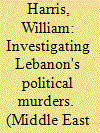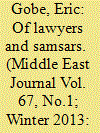| Srl | Item |
| 1 |
ID:
118260


|
|
|
|
|
| Publication |
2013.
|
| Summary/Abstract |
The Arab Spring has presented great challenges and opportunities throughout the region. New models of political participation, power-sharing, and evolving forms of social consensus dominate the landscape region-wide. The Arab Spring has also affected popular culture in significant ways which portend even greater social and relational evolution. As noted by a recent World Economic Forum (WEF) report, â??Although not all the regionâ??s countries have experienced political or economic transition, recent events have accelerated changes in public sentiment, raised levels of engagement and heightened expectations region wide.
|
|
|
|
|
|
|
|
|
|
|
|
|
|
|
|
| 2 |
ID:
118256


|
|
|
|
|
| Publication |
2013.
|
| Summary/Abstract |
This article reviews the investigation of Lebanon's 2004-2008 string of assassinations, a novel international venture precipitated by the February 2005 assassination of former prime minister Rafiq al-Hariri. It argues that shifting realist and idealist impulses on the international level, alongside a vicious struggle in Lebanon, allowed the intrusion of international justice in the form of the Special Tribunal for Lebanon (STL), although with meager results up to late 2012. The impact on Lebanon of the uprising in Syria against the Asad regime, a prime suspect in Lebanese assassinations, has both overshadowed the affair and raised the stakes involved in the STL's pursuit of it.
|
|
|
|
|
|
|
|
|
|
|
|
|
|
|
|
| 3 |
ID:
118257


|
|
|
|
|
| Publication |
2013.
|
| Summary/Abstract |
In 2002, what became known as the Middle East Quartet came into being. A decade later, this article explores the performance of the Quartet and the EU's role in it. The conclusions are sobering, pointing to the fact that, while the EU has been the principal driver behind the Quartet, the latter has neither become a genuinely multilateral forum, nor has it been effective in pursuing the goal of a two-state solution in the Middle East.
|
|
|
|
|
|
|
|
|
|
|
|
|
|
|
|
| 4 |
ID:
118258


|
|
|
|
|
| Publication |
2013.
|
| Summary/Abstract |
The recent history of the Tunisian Bar was symptomatic of repeated attempts by President Ben 'Ali's authoritarian state to subjugate a profession which was meant to guarantee respect for the rule of law and defendants' rights. To this end, the state established an apparatus intended to control the workings of the legal services market and reduce the profession's capacity for self-regulation. This situation led to the development of illegal practices and influenced a majority of lawyers to support the mobilization against Ben 'Ali's regime.
|
|
|
|
|
|
|
|
|
|
|
|
|
|
|
|
| 5 |
ID:
118259


|
|
|
|
|
| Publication |
2013.
|
| Summary/Abstract |
Ever since its inception, the state of Iran has been pressed with the challenge of integrating the multiple ethnic identities that make up its plural society. In contrast to a number of other minorities like the Kurds and the Baluchis, the Azeris have shown loyalty to the Iranian state to the surprise of foreign scholars and policy makers. They have done so even in spite of a number of potentially favorable political and economic conditions that could support the realization of national aspirations. This article addresses this puzzle: why, against seemingly favorable odds, have Iranian Azeris refrained from asserting their national ambitions and joining their newly independent kin north of the border? In an attempt to solve this puzzle, the paper will examine the triadic relationship among the Azeri minority in Iran, their home state (Iran), and their kin state (the Republic of Azerbaijan).
|
|
|
|
|
|
|
|
|
|
|
|
|
|
|
|